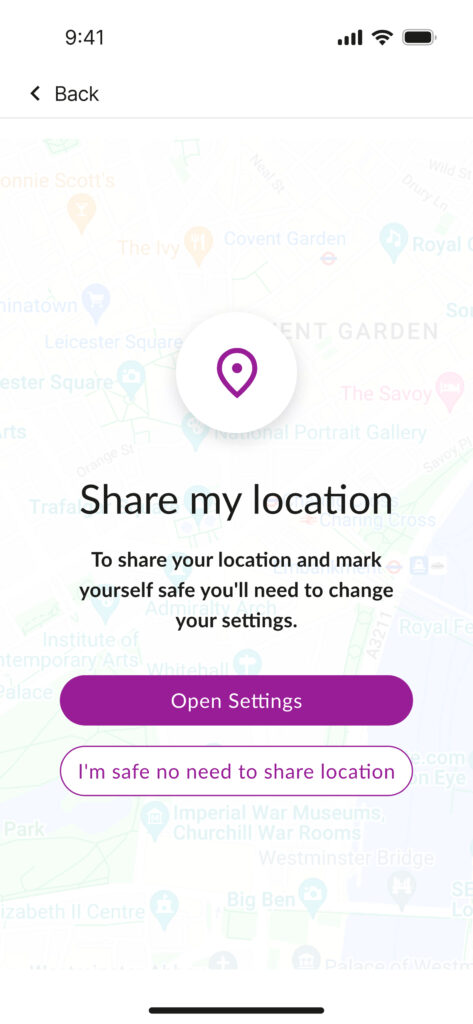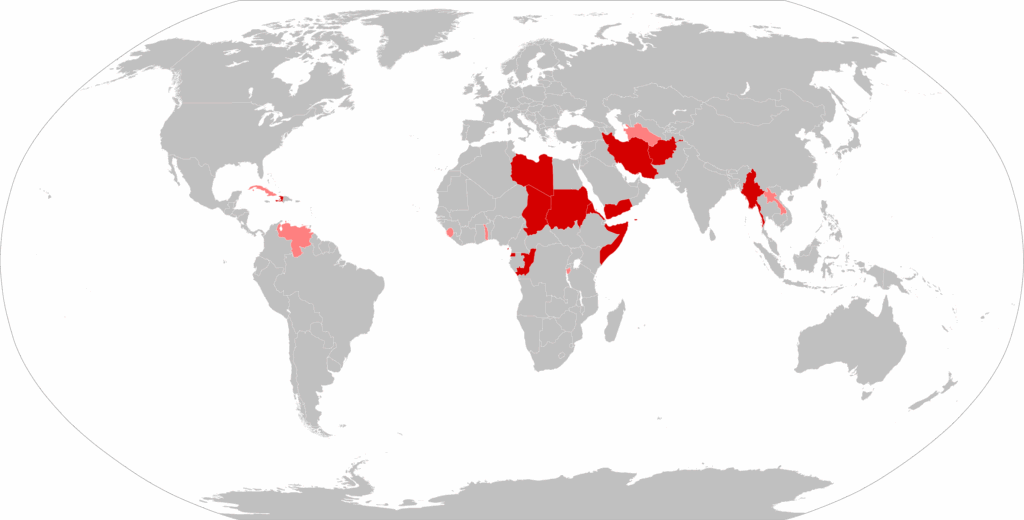With ongoing global conflicts, airspace closures, and evolving U.S. entry restrictions, travel managers and their travelers need clear risk management strategies. Here’s what to know when leaving, entering, or returning to the United States.
This article covers:
- Latest guidance – updated September 2025
- International travel rules and tips
- U.S. entry rules (U.S. travelers)
- U.S. entry rules (international travelers)
- U.S. entry restrictions/bans
- Key resources and links
Note: international and domestic travel rules and restrictions are highly fluid and subject to change. Always check the latest international travel advisories and local country advisories for the most up-to-date travel information and rules.
Latest guidance: September 2025
New visa fees & rules take effect: including $100,000 fee for H-1B visas
As of September 21, a new executive order introduces a $100,000 fee for H-1B visas (the program for employers to hire non-immigrants in specialized occupations).
Based on initial statements, the new fee will likely apply only to new applicants and not holders of existing visas or renewals and is expected to first apply in the coming H-1B lottery cycle (March 2026). We suggest checking with your own visa advisors before traveling to understand how the rules may apply to you and your travelers.
Current guidance suggests that travelers who already hold H-1B visas and are currently outside of the U.S. will not be charged $100,000 to re-enter. H-1B visa holders can leave and re-enter the U.S. as normal.
Additional reforms are under consideration and may be announced in the coming months, according to the U.S. Department of State.
The Electronic System for Travel Authorization (ESTA), used by Visa Waiver Program (VWP) travelers, will raise fees from $21 to $40 on September 30. Application submissions before that date will pay the current $21 fee.
As of September 2, most nonimmigrant visa applicants (including renewals) must interview in person with a consular officer. Many temporary visitors from VMP countries who previously qualified for automatic renewals will now need to interview in person.
Traveling from the U.S.: how to keep travelers safe
Current Climate
This summer, the U.S. State Department issued a global caution alert, advising increased vigilance when traveling internationally, especially in areas affected by armed conflict or airspace disruptions.
Before You Go
- Ensure passports are valid for at least 6 months beyond intended travel dates.
- Review the latest country-specific advisories on the State Department website.
- Enroll in the State Department’s Smart Traveler Enrollment Program (STEP) for real-time security alerts and embassy access.
- Prepare digital and physical copies of passports and key documents.
- Keep emergency contact information accessible and updated.
During Travel
- Stay alert and follow local news updates.
- Sign up for email or text alerts via a travel management company (TMC) like Reed & Mackay if available.
- Use location-sharing and check-in tools for safety tracking and updates.
Tips for Travel Managers
- Ensure your travelers’ profiles are current, especially for passports, visas, and emergency contacts.
- Use risk maps and ratings if provided by your TMC.

Returning to the U.S.: entry rules and risk management tips
At the Border
- Travelers, including U.S. citizens, may face additional questioning by U.S. Customs and Border Protection (CBP).
- U.S. citizens and lawful permanent residents cannot be denied reentry, but must confirm their identity and legal status.
- Refusing to answer travel-related questions may result in delays or further inspection.
Device and Data Privacy
- CBP can inspect phones, laptops, or tablets.
- U.S. citizens and lawful permanent residents may decline to provide passwords and cannot be denied entry for doing so, but could face delays or device seizure.
- Non-citizens risk denial of entry if they refuse to comply with device access requests.
Tips for Travel Managers
- Ensure your travelers are aware of entry requirements, rights, and that phones and devices are subject to search.
- Stay up-to-date with the latest requirements for U.S. travelers and citizens.
- Work with your TMC to disseminate information to your travelers.
- If concerned about sensitive information or data privacy, work with your IT department or consider having travelers download sensitive information to a device left at home during their trip.
Entering the U.S.: duty of care tips for international travelers
Entry Preparation
- Ensure possession of a valid passport (6+ months), an approved and valid ESTA or visa, and relevant travel documents (e.g., itinerary, tickets, boarding pass).
- Be aware that most nonimmigrant visa applicants (including renewals) must interview in person with a consular officer as of September 2025.
- Confirm visa type permits planned activities (e.g., tourism, business).
- During travel, carry copies of entry documents and comply with visa limits.
Border Searches & Digital Privacy
- CBP may request electronic device access.
- Travelers from visa waiver countries or with visas can be denied entry if they refuse access to their devices.
- CBP searched 14,899 devices carried by international travelers from April – June 2025, 16.7% higher than the previous period (January – March 2022).
Tips for Travel Managers
- Ensure that international travelers are aware that phones and devices are subject to search, and that they can be denied entry if they refuse to provide device passwords.
- Be aware of the new $100,000 fee for H-1B visa applicants. Existing visa holders and renewals will likely not need to pay the fee.
- Ensure your travelers under the Visa Waiver Program (VMP) that are applying for visas are aware that they may now need to interview in person (with some exceptions) – even if they qualified for automatic renewal in the past and are renewing a visa.
- Be aware of an increase ESTA fees – $40 as of September 30, 2025.
- Stay up-to-date with the latest requirements for international travelers.
- Work with your TMC to disseminate information to your travelers.
- If concerned about sensitive information or data privacy, work with your IT department or consider having travelers download sensitive information to a device left at home during their trip.
U.S. entry restrictions: what travelers must know
Full Entry Suspensions
12 countries: Afghanistan, Burma, Chad, Republic of the Congo, Equatorial Guinea, Eritrea, Haiti, Iran, Libya, Somalia, Sudan, and Yemen.
Limited Entry Suspensions
7 countries: Burundi, Cuba, Laos, Sierra Leone, Togo, Turkmenistan, Venezuela.
Exemptions include:
- U.S. lawful permanent residents
- Travelers with valid U.S. visas issued prior to June 9
- Dual nationals using non-restricted passports
- Certain humanitarian or diplomatic travelers

Possible Future Bans
As of June 15, the State Department is monitoring 36 additional countries for potential restrictions.
Tips for Travel Managers
- Review traveler profiles now to flag any impacted nationalities or routes, or reach out to immigration counsel.
- Refer to State Department guidance for up-to-date eligibility.
Key resources for U.S. entry and travel risk management
Use these resources to meet your duty of care obligations, manage travel risk, and keep travelers informed when entering or leaving the U.S.
International Travel Safety and Risk Management Info
Travel Advisories (U.S. Department of State)
Learn About Your Destination (U.S. Department of State)
Smart Traveler Enrollment Program (U.S. Department of State)
International Travel Requirements
Traveling in Europe (U.S. Department of State)
Get an electronic travel authorisation (ETA) to visit the UK (gov.uk)
Applying for a Schengen visa (European Commission)
U.S. citizens traveling abroad (USA.gov)
Visa Waiver Program and ESTA Resources
Visa Waiver Program (U.S. Department of State)
List of Countries in the Visa Waiver Program (U.S. Department of Homeland Security)
New U.S. Visa Rules Begin September 2: What You Need to Know (MSN.com)
Visa Bulletin for September 2025 (U.S. Department of State)
Official ESTA Application Website (U.S. Customs and Border Protection)
ESTA FAQs (U.S. Customs and Border Protection)
Visas and Other Documents
Visa Wizard (U.S. Department of State)
Directory of Visa Categories (U.S. Department of State)
H-1B Visa Information
H-1B FAQ (U.S. Department of State)
H-1B Specialty Occupations (U.S. Citizenship and Immigration Services)
Border Searches and Device Security Tips
Border Search of Electronic Devices at Ports of Entry (U.S. Customs and Border Protection)
Know Your Rights: Enforcement at the Airport (ACLU)
Clearing Customs (U.S. Customs and Border Protection)
Prohibited and Restricted Items (U.S. Customs and Border Protection)
Travel to/Within the U.S. as a Visitor
Get in touch
Email us at [email protected] to discuss all of your corporate travel and event management needs.




